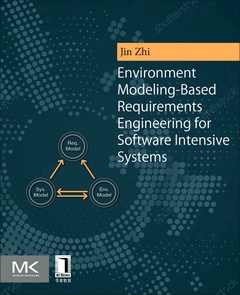Environment Modeling-Based Requirements Engineering for Software Intensive Systems
Auteur : Jin Zhi

Environment Modeling-Based Requirements Engineering for Software Intensive Systems provides a new and promising approach for engineering the requirements of software-intensive systems, presenting a systematic, promising approach to identifying, clarifying, modeling, deriving, and validating the requirements of software-intensive systems from well-modeled environment simulations. In addition, the book presents a new view of software capability, i.e. the effect-based software capability in terms of environment modeling.
1. Preface2. Requirements Engineering: State of Art3. Software Intensive Systems and the Challenges to Requirements Engineering4. Principles, Conceptual Framework and Process5. Environment Modelling and System Requirements Identification6. Software Functionality Identification and Specification7. Environment Related Non-functional Properties Analysis8. Concern about Self-adaptation9. Conclusion10. Index
The primary audience for this book is requirements engineering researchers. It can also be used as reference for graduate students and researchers, industrial practitioners in knowledge engineering, software engineering, and project management, etc
- Provides novel and systematic methodologies for engineering the requirements of software-intensive systems
- Describes ontologies and easily-understandable notations for modeling software-intensive systems
- Analyzes the functional and non-functional requirements based on the properties of the software surroundings
- Provides an essential, practical guide and formalization tools for the task of identifying the requirements of software-intensive systems
- Gives system analysts and requirements engineers insight into how to recognize and structure the problems of developing software-intensive systems
Date de parution : 12-2017
Ouvrage de 288 p.
19x23.3 cm
Thème d’Environment Modeling-Based Requirements Engineering for... :
Mots-clés :
Adaptation; Attribute; Basic state machine; Biddable entity; Buffer pattern; Business capability; Capability aggregation; Capability analysis; Capability assignment; Capability comparison; Capability composition; Capability decomposition; Capability model; Capability planning agents; Capability profile; Capability projection; Capability refinement; Causal entity; Causal phenomena; Choreography; Conformance-based; Context similarity; Control capability; Control loop; Cybernetics; Decryption; Dependency; Domain modeling; Domain ontology; Dynamic adaption; Encryption; Environment entity; Environment ontology; Environment; Feature model; Four-variable model; Function and control capability profile cluster; Function level; Goal-Oriented Requirements Engineering; Goal-oriented; Hazard and operability study; Index pattern; Intentional property; Interaction; Keyword-based search; Knowledge engineering; Kripke structure; Log pattern; Modeling dynamic; Nonfunctional requirement; Ontology; Open and nondeterministic environment; Orchestration; Partition; Problem frame; Problem frames approach; Problem; Requirements; Requirements-driven; Rule-based; Scenario; Service-oriented computing; Situation awareness; Smart map; Software-intensive; Solution; Specification; Stakeholder; Subsumption; Symbolic phenomena; Syntax-based language; System capability; System entity; System level; To-be system; Tree-like hierarchical state machine; Unified model of dependability; Variability; Virtual capability agents; Web service modeling



